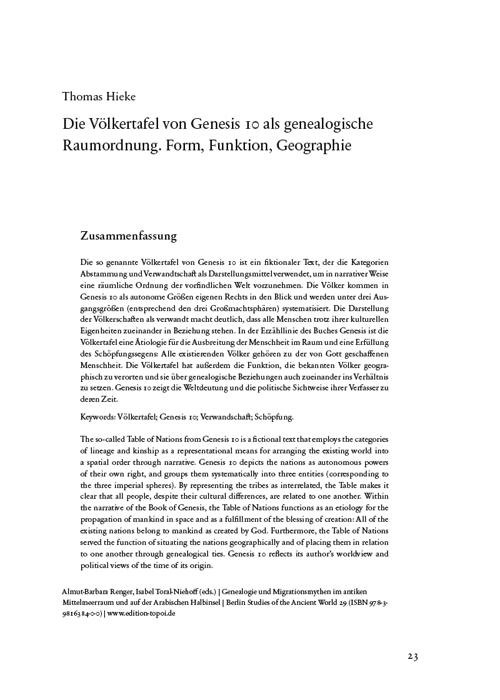Die Völkertafel von Genesis 10 als genealogische Raumordnung
Form, Funktion, Geographie
The so-called Table of Nations from Genesis 10 is a fictional text that employs the categories of lineage and kinship as a representational means for arranging the existing world into a spatial order through narrative. Genesis 10 depicts the nations as autonomous powers of their own right, and groups them systematically into three entities (corresponding to the three imperial spheres). By representing the tribes as interrelated, the Table makes it clear that all people, despite their cultural differences, are related to one another. Within the narrative of the Book of Genesis, the Table of Nations functions as an etiology for the propagation of mankind in space and as a fulfillment of the blessing of creation: All of the existing nations belong to mankind as created by God. Furthermore, the Table of Nations served the function of situating the nations geographically and of placing them in relation to one another through genealogical ties. Genesis 10 reflects its author’s worldview and political views of the time of its origin.
Die so genannte Völkertafel von Genesis 10 ist ein fiktionaler Text, der die Kategorien Abstammung und Verwandtschaft als Darstellungsmittel verwendet, um in narrativer Weise eine räumliche Ordnung der vorfindlichen Welt vorzunehmen. Die Völker kommen in Genesis 10 als autonome Größen eigenen Rechts in den Blick und werden unter drei Ausgangsgrößen (entsprechend den drei Großmachtsphären) systematisiert. Die Darstellung der Völkerschaften als verwandt macht deutlich, dass alle Menschen trotz ihrer kulturellen Eigenheiten zueinander in Beziehung stehen. In der Erzähllinie des Buches Genesis ist die Völkertafel eine Ätiologie für die Ausbreitung der Menschheit im Raum und eine Erfüllung des Schöpfungssegens: Alle existierenden Völker gehören zu der von Gott geschaffenen Menschheit. Die Völkertafel hat außerdem die Funktion, die bekannten Völker geographisch zu verorten und sie über genealogische Beziehungen auch zueinander ins Verhältnis zu setzen. Genesis 10 zeigt die Weltdeutung und die politische Sichtweise ihrer Verfasser zu deren Zeit.

